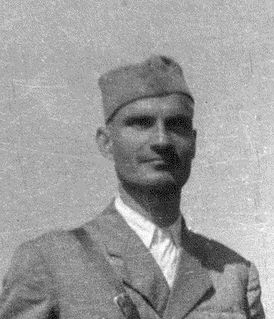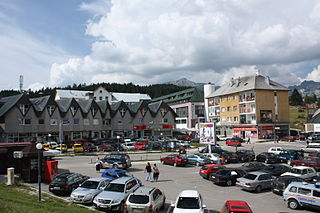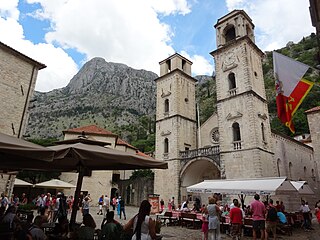
Yugoslavia was a country in Southeastern and Central Europe for most of the 20th century. It came into existence after World War I in 1918 under the name of the Kingdom of Serbs, Croats and Slovenes by the merger of the provisional State of Slovenes, Croats and Serbs with the Kingdom of Serbia, and constituted the first union of the South Slavic people as a sovereign state, following centuries in which the region had been part of the Ottoman Empire and then Austria-Hungary. Peter I of Serbia was its first sovereign. The kingdom gained international recognition on 13 July 1922 at the Conference of Ambassadors in Paris. The official name of the state was changed to Kingdom of Yugoslavia on 3 October 1929.

The Socialist Federal Republic of Yugoslavia was a country located in central and Southeastern Europe that existed from its foundation in the aftermath of World War II until its dissolution in 1992 amid the Yugoslav Wars. Covering an area of 255,804 km², the SFRY was bordered by the Adriatic Sea and Italy to the west, Austria and Hungary to the north, Bulgaria and Romania to the east, and Albania and Greece to the south.

Arsenije "Arso" Jovanović was a Yugoslav partisan general and their foremost military commander to participate in World War II in Yugoslavia.

Sava Kovačević was a Yugoslav Partisan divisional commander during World War II, and one of the heroes of the communist Partisan movement.

Žabljak is a small town in northern Montenegro. It has a population of 1,723.
Piperi is one of seven traditional Highland tribes and a historical region in northeastern Montenegro, spanning a region between the Morača and Zeta rivers, reaching the northern suburbs of the Montenegrin capital Podgorica. The Piperi are regarded as one of the most bellicose tribes during the wars with the Ottoman Empire, in the history of Montenegro.

The Catholic Church in Montenegro is a part of the worldwide Catholic Church, under the spiritual leadership of the Pope in Rome. There are 21,299 Catholics in Montenegro, and they form three and a half percent of the population. Most Catholics are ethnic Albanians and Croats as well as some Montenegrins.

Fudbalski Klub Čelik Nikšić is a football club based in Nikšić, Montenegro. Founded in 1957, they currently compete in Montenegrin Second League. The team once won Montenegrin Cup trophy.

Rail transport in Montenegro is operated by four separate companies, which independently handle railway infrastructure, passenger transport, cargo transport and maintenance of the rolling stock. The four companies were a part of public company Railways of Montenegro until it was split up in 2008.

Mexico–Serbia relations refers to the diplomatic relations between Mexico and Serbia. Both nations were founding members of the Group of 77 and the United Nations.
Nikšić Municipality is one of the municipalities of Montenegro. The centre is Nikšić. This municipality has the largest landmass of any municipality in Montenegro, and includes 129 settlements. It was also largest landmass municipality in socialist Yugoslavia.

Čedomir "Ljubo" Čupić was a Yugoslav law student, political commissioner of Communist resistance movement in Nikšić, Montenegro and a decorated war hero of SFR Yugoslavia. He became famous for the photo of him taken moments before he was shot by Chetnik collaborators who captured him, showing him with shackles on his hands and smiling. He is a recipient of the Order of the People's Hero, a Yugoslav medal for gallantry. He is commonly referred to by media as "the Montenegrin Che Guevara".

Glušica Nikšić is an intercity bus company based in Nikšić, Montenegro. With a fleet of coach buses, the company operates within the Nikšić municipality as well as to international destinations in Bosnia and Herzegovina and Serbia.
AK Nikšić is an athletics club from Nikšić, Montenegro. It was founded on 31 July 1997 by former marathoner Drago Musić. It competes in domestic competitions sanctioned by the Athletic Federation of Montenegro. It is also one of the most prolific organizers of cross country and road races in Montenegro.

Borislav Milošević was a Yugoslav diplomat who last served as Yugoslav ambassador to Algeria, Japan and Russia. He was the elder brother of former Yugoslav and Serbian president Slobodan Milošević.
The Allied bombing of Yugoslavia in World War II involved air attacks on cities and towns in the Kingdom of Yugoslavia by the United States Army Air Force (USAAF) and Royal Air Force (RAF), including the Balkan Air Force (BAF), between 1941 and 1945, during which period the entire country was occupied by the Axis powers. Dozens of Yugoslav cities and towns were bombed, many repeatedly. These attacks included intensive air support for partisan operations in May–June 1944, and a bombing campaign against transport infrastructure in September 1944 as the German Wehrmacht withdrew from the Balkans. This latter operation was known as Operation Ratweek. Some of the attacks caused significant civilian casualties.
The Battle of Pljevlja, was a World War II attack in the state of Montenegro by partisans on Italian military forces occupying the city of Pljevlja under the command of General Arso Jovanović and Colonel Bajo Sekulić, who led 4,000 Montenegrin Partisans.


















